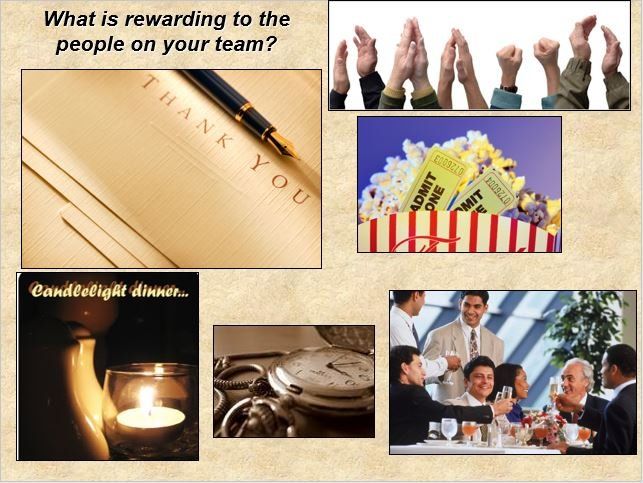Accountability - Tracking Progress & Celebrating Success
Do you know how your employees like to be recognized?
We’ve been talking about accountability, whether personal, team, or leadership. In our last post
, we discussed the ways leaders can promote accountability, and touched on progress-tracking. Now let’s turn our attention to what might happen during these tracking sessions.
One of the most frequent and negative ways for someone to lose the trust of their leader and fellow team members is through the element of surprise.
Negative surprises like, “I’m not going to hit that target date tomorrow” or “Surprise, this project is going way over budget,” can put you as the team leader in a difficult position. Your first priority is to deal with the situation at hand; the second priority must be to have a candid discussion with the individual.
Try not to jump to conclusions about this person’s intent or motives, because sometimes, “We give ourselves credit for our intentions; but hold others accountable for their results.”
In other words, we are always aware of our own reasons for acting as we did, whereas we only see the effects of others’ actions.
Your main goal should be to understand what caused the delay, and why there was not more advance notice about the problem. Explain the ramifications of the employee’s actions
– for you personally, for the task or project, and for others on or outside the team. The better you comprehend what occurred, the more you can help them to learn from the situation. Keep your conversation positive and future-focused.
On the other hand, if this is a recurring problem, you might need to take further action. Leaving these issues unaddressed and unresolved will likely mean this will happen again in the future.
However, what about the opposite situation, when you need to commend your employees for a job well done? Let’s say you’ve reached the end of the project, and it is a success. How are you going to reward and recognize this accomplishment?
Ideally, as a team, you would have already decided this, since it is better to have this reward as an incentive versus an after-the-fact "bonus".
Many books on the market describe a multitude of ways to show your appreciation to employees, but bear this in mind: appreciating differences in others means discovering how individuals like to be rewarded and recognized for their contributions
. This is really just an extension of treating each person like a unique individual.
Do you know how your employees like to be recognized?
It may be different than you think. Know how to find out? Ask them.
You might fear that each of them will say they want money, but it might surprise you to find out that there are other ways to express your appreciation-a day off to spend with their family, a gift card to a movie or local restaurant. It might even be something as simple as a personal, handwritten thank-you note. If you saved at least one note of thanks that you received over the years, then you are like many other people I have asked in my team effectiveness sessions.
In our next post
, we’ll look at an example of a team that took the issue of employee appreciation to heart. We’ll see how the leaders of this team turned their team around, by making a point to reward the right kind of behavior,
in an effective way. Through this example you’ll learn more about the leaders’ role in using positive reinforcement to strengthen personal accountability.






